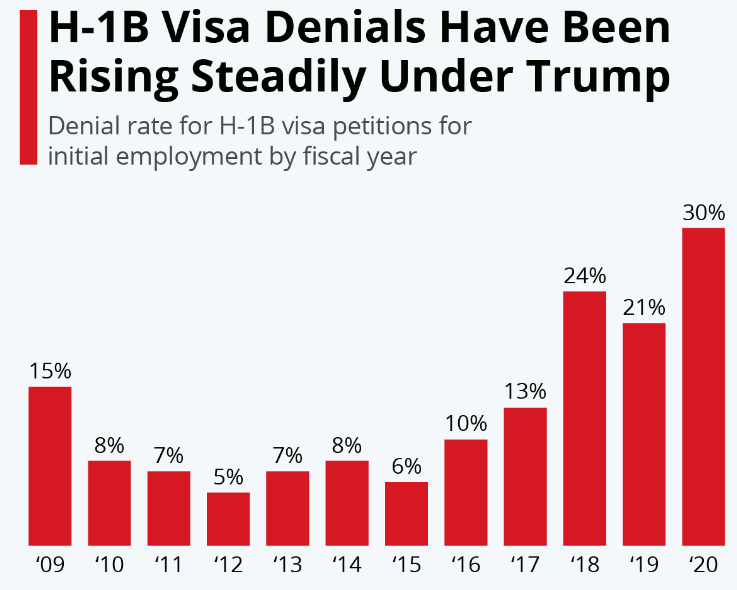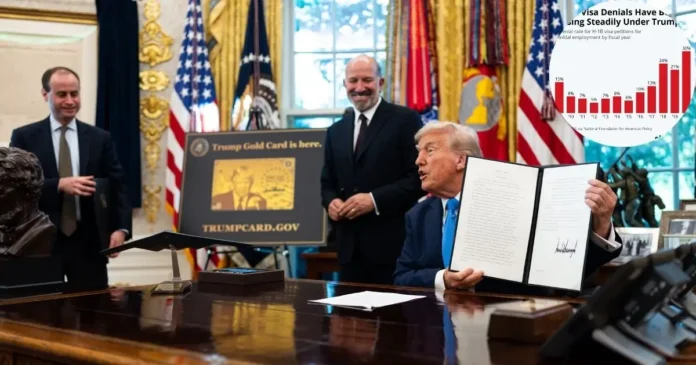Introduction: A Turning Point in America’s Skilled Visa Landscape
In October 2025, former President Donald Trump’s administration reignited global debate by announcing major H-1B visa reforms, including a new $100,000 filing fee for certain applicants. The move, part of a broader push for “America First” labor priorities, has shaken the U.S. tech and education sectors, especially among employers reliant on international talent.
This move, described by the White House as part of an “America First Workforce Initiative,” has sparked strong reactions from the tech industry, universities, and global talent communities.
If you’re searching to understand the Trump H1B visa executive order, what it means for H1B visa requirements, and how it impacts employers and foreign professionals, this guide breaks everything down clearly and factually.
Trump H1B Visa Overview: Purpose and Requirements (2025 Update)
The H1B visa allows U.S. employers to hire foreign professionals in specialty occupations that require theoretical or technical expertise — such as IT, engineering, healthcare, or finance.
Basic Trump H1B Visa Requirements (as of 2025)
To qualify for an H1B visa, applicants must:
- Hold at least a bachelor’s degree or equivalent in a relevant field.
- Have a job offer from a U.S. employer willing to sponsor the visa.
- Be paid at or above the prevailing wage determined by the Department of Labor (DOL).
- File an approved Labor Condition Application (LCA) before petitioning USCIS.
Cap and Lottery:
Each year, 85,000 H1B visas are issued — 65,000 under the general cap and 20,000 for U.S. master’s degree holders.
Validity:
The visa is typically granted for three years, renewable for up to six years.

Trump’s $100,000 Fee: A New Era for H1B Petitions
In October 2025, the Trump administration officially announced a new $100,000 filing fee for H1B petitions via an executive order titled “Restoring Fairness to the American Worker.”
Key Points:
- The fee applies only to new petitions for beneficiaries outside the U.S.
- It does not affect renewals, transfers, or extensions for current H1B holders.
- It will take effect for the FY 2027 H1B lottery, beginning in March 2026.
- Employers filing for new foreign hires must pay the additional fee on top of standard USCIS filing costs.
The administration justifies the policy as a way to protect U.S. workers, reduce “cheap labor pipelines,” and ensure only high-value applicants enter the U.S. workforce.
The Trump H1B Visa Executive Order: Key Provisions
The executive order, signed on October 1, 2025, introduces several major provisions beyond the $100,000 fee.
Highlights from the Executive Order:
- Fee Requirement: Establishes the one-time $100K fee for new petitions filed abroad.
- Wage Prioritization: Directs DHS to favor higher-salaried applicants in future H1B lotteries.
- Prevailing Wage Reform: Instructs the DOL to revise wage levels upward to reflect true market value.
- Compliance Enforcement: Expands audits on companies suspected of outsourcing abuse.
- National Interest Waiver (NIW): Allows exemptions for applicants working in nationally vital fields such as healthcare, defense, and advanced research.
This marks the most significant executive intervention in the H1B system since the early 2000s.
Why the Policy Was Introduced: Economic and Political Context
The Trump administration argues that this change is designed to:
- Protect American jobs in post-recession recovery.
- Reduce perceived abuse of the H-1B system by outsourcing companies.
- Raise program standards, ensuring only high-value, high-skill professionals qualify.
Supporters believe it will redirect opportunities to U.S. citizens and incentivize companies to train domestic talent. Critics, however, say it risks crippling innovation in tech, healthcare, and research — industries that rely heavily on skilled global workers.
Economists note that these measures come amid broader attempts to reform employment-based visas and introduce merit-based immigration scoring systems.
Who Must Pay the $100,000 Fee? Clarifying Eligibility
The $100K fee specifically targets new foreign workers applying from outside the U.S. who have not previously held H-1B status.
| Category | Fee Applicability | Notes |
| First-time H-1B applicants (outside U.S.) | ✅ Yes | Applies under the new rule |
| Current H-1B holders renewing or changing employer | 🚫 No | Exempt from fee |
| H-1B to Green Card transition | 🚫 No | Exempt |
| Cap-exempt employers (universities, nonprofits) | ⚠️ Possibly | Pending DHS clarification |
This nuance ensures the rule targets incoming hires rather than punishing existing legal workers, aligning it with the administration’s “prospective control” approach.
National Interest Waiver (NIW) – A Potential Exemption Path
One emerging discussion point is the National Interest Waiver (NIW), which may provide an exemption from the $100,000 fee for applicants whose work benefits the U.S. economy or security.
This could include professionals in:
- Healthcare and biotech, addressing national shortages.
- AI and cybersecurity align with defense interests.
- Higher education and research, driving U.S. innovation.
While USCIS has not yet published formal NIW guidance, insiders suggest such exemptions could mirror those used under EB-2 visa categories — offering a crucial alternative for qualified experts.
DOL and DHS Reforms: Wage and Lottery Prioritization
In addition to the new fee, the Department of Labor (DOL) and Department of Homeland Security (DHS) announced further H-1B program reforms in October 2025:
- DOL has initiated a rulemaking process to raise prevailing wage levels across all H-1B categories.
- DHS proposed prioritizing higher-paid applicants in future H-1B lotteries, replacing the current random selection.
These steps reflect a major policy shift — rewarding companies offering competitive salaries and discouraging the use of H-1B workers in low-cost outsourcing roles.
For employers, this means budgeting for significantly higher compensation packages to remain competitive in the upcoming H-1B season.
The October 3, 2025 Lawsuit: Legal Challenge Underway
On October 3, 2025, a coalition of labor unions, universities, and healthcare organizations filed a federal lawsuit in the D.C. Circuit Court.
They argue that President Trump’s executive order imposing the $100K fee:
- Violates the Administrative Procedure Act (APA) by bypassing required rulemaking procedures.
- Exceeds presidential authority under existing immigration statutes.
- Undermines workforce stability in essential industries like healthcare and education.
This legal battle could decide whether the new H-1B fee survives or is suspended — and many experts expect injunctions or court orders by early 2026.
Real-World Implications for Workers and Employers
For Foreign Workers
- Higher barriers to entry mean fewer opportunities for first-time applicants.
- Applicants in STEM, healthcare, and research may still qualify under NIW exemptions.
- Many professionals may consider Canada, the UK, or Australia as alternative destinations.
For U.S. Employers
- Increased hiring costs may limit the recruitment of international talent.
- Some firms are shifting toward remote overseas employment or L-1 intracompany transfers.
- Universities and hospitals are lobbying for NIW-based exceptions for essential staff.
In short, while established H-1B professionals are safe, new applicants face the most uncertainty.
Economic and Political Outlook
Experts believe these policies are part of a broader “America First Labor Framework” aimed at domestic upskilling.
However, many economists warn it could:
- Reduce innovation output in U.S. tech industries by 15–20%.
- Slow STEM-based economic growth, especially in startup ecosystems.
- Increase operational costs for multinational firms.
If legal challenges succeed or if the 2026 election changes leadership, some of these provisions could be delayed or reversed.
Conclusion: Navigating the New H-1B Reality
The Trump H-1B 2025 policy marks one of the most consequential immigration shifts in recent years — combining economic nationalism, fee deterrence, and wage reform.
For now, H-1B professionals already working in the U.S. remain unaffected, but new overseas applicants should prepare for higher financial and regulatory barriers.
Employers, meanwhile, must adapt recruitment strategies, explore NIW exemptions, and stay alert to court rulings that could reshape the landscape again before the FY 2027 season.
Key Takeaways
- The $100K fee applies only to new H-1B applicants outside the U.S.
- Effective for FY 2027 (filed in 2026).
- NIW exemptions could apply to high-value sectors like healthcare and research.
- DOL and DHS are pursuing wage and lottery reforms.
- A major lawsuit filed on Oct 3, 2025, challenges the rule’s legality.
FAQ
Q1. What is Trump’s new H-1B visa fee?
A: It’s a $100,000 filing fee for new H-1B petitions filed for beneficiaries outside the U.S., effective FY 2027 (filed in 2026).
Q2. Does the new fee affect existing H-1B holders?
A: No. It only applies to new petitions for first-time beneficiaries abroad.
Q3. Are there exemptions to the fee?
A: Potentially, through the National Interest Waiver (NIW) for sectors vital to U.S. interests like healthcare and defense.
Q4. When will this rule take effect?
A: For the FY 2027 lottery, beginning with applications in March 2026.
Q5. Has the policy been legally challenged?
A: Yes, a lawsuit was filed on October 3, 2025, arguing the rule violates federal law and exceeds presidential authority.
Also Read:

